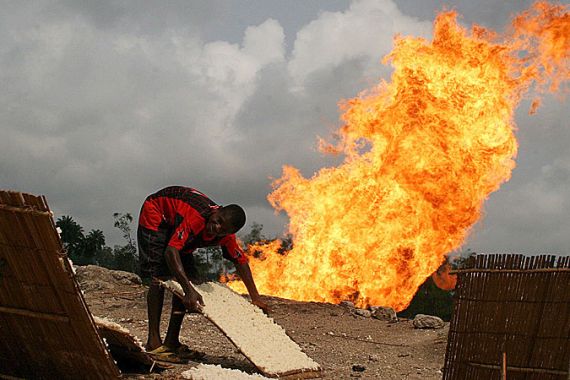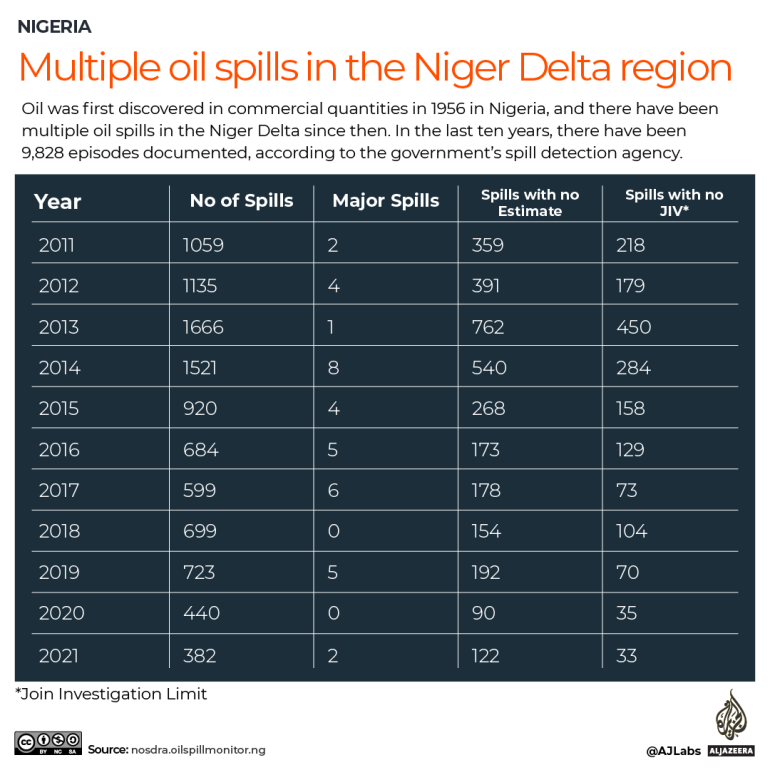Niger Delta decries slow cleanups, decades after oil spills
Niger Delta locals say remediation work is slow and appeal to the government to hasten the restoration of the polluted environment.

Port Harcourt, Nigeria – Prince Gbosidan still remembers April 12, 2009. Vividly.
It was the day fire from a big oil spill spread to his hometown Deeyor-Kira from an oil facility in neighbouring Kegbara-Dere and destroyed his farmlands.
Keep reading
list of 4 itemsAre seed-sowing drones the answer to global deforestation?
Rainfall set to help crews battling wildfire near Canada’s Fort McMurray
The Alabama town living and dying in the shadow of chemical plants
“Before the spill, you can plant within four to six months and you will get a good yield,” the 49-year-old father of four told Al Jazeera. “But now, we are living in abject poverty because our livelihoods have been destroyed. I have stopped farming because there is no point farming when you don’t get anything.”
In the mid-1970s, when Gbosidan started farming alongside his father, in Deeyor-Kira in Nigeria’s oil-rich Rivers State, yields were bountiful and people from neighbouring communities came to buy huge yams at his village market, he said.
But harvesting enough to meet his family’s daily needs is difficult these days, he said, because of the spill and subsequent incidents.
For decades, crude oil from the Niger Delta accounted for an overwhelming majority of Nigeria’s export earnings. But pollution from repeated oil spills continues to endanger the lives of the 30 million residents of the region which spans nine states and has a coastline of approximately 450 kilometres (280 miles).
Between 2011 and 2021, there were 9,870 spill incidents, which released a combined 466,214 barrels of oil into the environment, according to data from the National Oil Spill Detection and Response Agency (NOSDRA), which is responsible for monitoring and responding to oil spills in Nigeria.
About 16,000 infants in the Niger Delta died within the first month of their life in 2012 because of oil spills, according to a 2019 study published in the Proceedings of the National Academy of Sciences (PNAS) journal by researchers at the Swiss Institute for International Economics, University of St Gallen.
Life expectancy in the region is now 41 years, 10 years lower than the national average.

Ogoni problem
The most internationally known incident is the 2011 Bonga oil spill from a Shell oilfield, in which 40,000 barrels of oil spilled into the Atlantic Ocean and affected 168,000 people in 350 communities in Nigeria’s states of Bayelsa and Delta.
The incident led NOSDRA to impose a $3.6bn fine on Shell – which also owned the facility where the 2009 spill happened – in December 2014. Three years later, Oil Spill Victims Vanguard (OSPIVV), a local nonprofit, filed a suit asking a UK court to compel Shell to clean up the heavily polluted environment and pay compensation to 168,000 people directly affected by the spill and the communities.
The case is still in court, OSPIVV’s General Manager Aloysius Okerieke told Al Jazeera.
Ogoniland, 261 communities spread across four local government areas of Rivers State, covers nearly 1,000sq km (385sq miles). Historically, it has been the epicentre of the pollution.
Between 1976 and 1991 alone, more than two million barrels of oil in 2,976 separate oil spills polluted the area, according to Friends of the Earth International, an organisation promoting environmental and social justice.
Analysts say this oil-rich region has been polluted because of poorly maintained pipelines by foreign and domestic oil companies.
“The Ogoni problem started with issues associated with faulty, old and exposed pipelines that have served their lifetime,” said Emmanuel Obemeata, an environmental health scientist and senior lecturer at the University of Port Harcourt. “Every company is expected to do pipeline maintenance and carry out an environmental survey every five years. If these companies are not performing their responsibilities, then you expect this kind of thing to happen.”
The repeated oil spill incidents triggered an environmental assessment report by the United Nations Environment Programme (UNEP). Published in August 2011, the report found widespread contamination of soil and groundwater and recommended a comprehensive clean-up to restore polluted environments in the area.
Five years later, the cleanup was launched in a glamorous affair at Bodo community in Ogoniland with notable attendees such as Vice President Yemi Osinbajo and Deputy Secretary-General of the United Nations Amina Mohammed, who was then the country’s environment minister.
Osinbajo, who inaugurated the clean-up, said the environmental restoration of Ogoniland would take 25 to 30 years and that the “methodology for the clean-up will ensure job creation for young people”.
“Oil exploration and production have been going on in Nigeria for six decades. Oil has given a boost to the Nigerian economy, but the ecosystem of the Niger Delta has been severely damaged. Fishing and agriculture have been badly affected,” he said at the event.
Needless delays
But it was not until 2018 that Hydrocarbon Pollution Remediation Project (HYPREP), the government agency coordinating the process, commenced preliminary remediation on polluted sites.
So far, it has awarded 50 site lots to contractors in a process estimated to be costing as much as $1bn. But experts said this was poorly done, blaming HYPREP for flouting the rules.
The criticism dovetails with an investigation by the local paper Premium Times which revealed that companies with no remediation experience were awarded Ogoni clean-up contracts. One lot reportedly went to an animal husbandry company and another to a finance and development consultancy.
“The cleanup exercise has not been going according to recommendations by UNEP,” Obemeata said. “Unless the current leadership takes this seriously [and] tries to avoid politicising the whole process, it is only then we will think of making progress.”
“The entire cleanup will be called into question [and] eventually, remediation will be done again,” Saatah Nubari, president of civil society group Niger Delta Congress, told Al Jazeera.
‘Multidimensional operation’
In addition to soil remediation, UNEP recommended the provision of clean water across Ogoniland because many water sources had been contaminated.
This could lead to health complications for the locals, Charles Oyibo, an environmental scientist and lecturer at Niger Delta University, told Al Jazeera.
“The [impact] keeps piling up until they become magnified and over time, they will begin to manifest to health complications like cancer,” he said.
“The [contaminated] streams are our source of water supply … we go there to fetch water to drink,” 59-year-old Nyiedha Nasikpo, the one-time ruler of the Bomu community, said.
The entire clean-up process, Oyibo said, is fraught with gaps and needs experts from various disciplines, not just HYPREP.
“HYPREP is not a clean-up agency. It should be a regulatory agency and [more] like the government’s eye on the project,” he said. “Cleanup is a multidimensional operation that needs multidisciplinary experts such as medical doctors and agronomists because we are looking at a situation where water bodies will be remediated, vegetation will be reactivated, and soil be remediated.”
HYPREP did not respond to requests for comment from Al Jazeera.
In Deeyor-Kira, Gbosidan has lost hope in the exercise.
“The people have been subjected to untold hardship. Now there is no money and there is illness. If you don’t have money to treat yourself, you die.
“What I want is for the Nigerian government to come for a visit and see things for themselves,” he said.